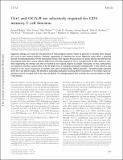Oct1 and OCA-B are selectively required for CD4 memory T cell function
Author(s)
Shakya, Arvind; Goren, Alon; Shalek, Alex; German, Cody N.; Snook, Jeremy; Kuchroo, Vijay K.; Yosef, Nir; Chan, Raymond C.; Regev, Aviv; Williams, Matthew A.; Tantin, Dean; ... Show more Show less
DownloadJEM_20150363.pdf (3.110Mb)
PUBLISHER_CC
Publisher with Creative Commons License
Creative Commons Attribution
Terms of use
Metadata
Show full item recordAbstract
Epigenetic changes are crucial for the generation of immunological memory. Failure to generate or maintain these changes will result in poor memory responses. Similarly, augmenting or stabilizing the correct epigenetic states offers a potential method of enhancing memory. Yet the transcription factors that regulate these processes are poorly defined. We find that the transcription factor Oct1 and its cofactor OCA-B are selectively required for the in vivo generation of CD4⁺ memory T cells. More importantly, the memory cells that are formed do not respond properly to antigen reencounter. In vitro, both proteins are required to maintain a poised state at the Il2 target locus in resting but previously stimulated CD4⁺ T cells. OCA-B is also required for the robust reexpression of multiple other genes including Ifng. ChIPseq identifies ~50 differentially expressed direct Oct1 and OCA-B targets. We identify an underlying mechanism involving OCA-B recruitment of the histone lysine demethylase Jmjd1a to targets such as Il2, Ifng, and Zbtb32. The findings pinpoint Oct1 and OCA-B as central mediators of CD4⁺ T cell memory.
Date issued
2015-10Department
Massachusetts Institute of Technology. Department of BiologyJournal
The Journal of Experimental Medicine
Publisher
Rockefeller University Press
Citation
Shakya, Arvind et al. “Oct1 and OCA-B Are Selectively Required for CD4 Memory T Cell Function.” The Journal of Experimental Medicine 212, 12 (October 2015): 2115–2131 © 2015 Shakya et al
Version: Final published version
ISSN
0022-1007
1540-9538